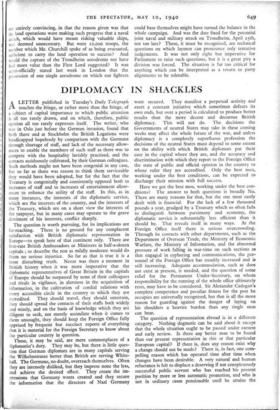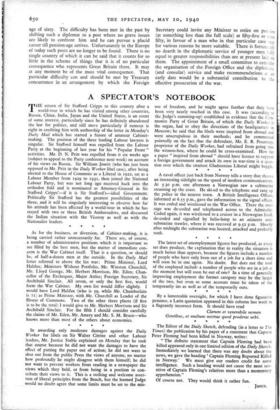DIPLOMACY IN SHACKLES
ALETTER published in Tuesday's Daily Telegraph touches the fringe, or rather more than the fringe, of a subject of capital importance to which public attention is all too rarely drawn, and on which, therefore, public opinion all too rarely expresses itself. The writer, who was in Oslo just before the German invasion, found that both there and at Stockholm the British Legations were handicapped hopelessly by comparison with the Germans through shortage of staff, and lack of the necessary allow- ances to enable the members of such staff as there was to compete with the hospitality lavishly practised, and the contacts assiduously cultivated, by their German colleagues. Such methods might not have been congenial in any case, but so far as there was reason to think them serviceable they would have been, adopted, but for the fact that the Treasury is congenitally and consistently opposed both to increases of staff and to increases of entertainment allow- ances to enhance the utility of the staff. In this, as in many instances, the interests of the diplomatic service, which are the interests of the country, and the interests of the Treasury, which are on a short view the interests of the taxpayer, but in many cases may operate to the grave detriment of his interests, conflict sharply.
The question is worth pursuing, for its implications are far-reaching. There is no ground for any complacent satisfaction with British diplomatic representation in Europe—to speak here of that continent only. There are first-rate British Ambassadors or Ministers in half-a-dozen capitals ; to describe the rest as mildly moderate would do them no serious injustice. So far as that is true it is a most disturbing truth. Never was there a moment in British history when it was more imperative that the diplomatic representatives of Great Britain in the capitals of Europe should be surpassed by none of their colleagues and rivals in vigilance, in alertness in the acquisition of information, in the cultivation of cordial relations with every accessible circle in the country to which they are accredited. They should travel, they should entertain, t hey should spread the contacts of their staffs both widely and wisely, and on the basis of knowledge which they are diligent to seek, not merely assimilate when it comes to them unsought, they should keep the Foreign Office fully apprised by frequent but succinct reports of everything that it is material for the Foreign Secretary to know about the particular country in question.
These, it may be said, are mere commonplaces of a diplomatist's duty. They may be, but there is little ques- tion that German diplomats are in many capitals serving the Wilhelmstrasse better than British are serving White- hall. The Germans, no doubt, overreach themselves. Often they are intensely disliked, but they impress none the less, and achieve the desired effect. They create the im- pressions that Germany wants created and they secure the information that the directors of Nazi Germany want secured. They manifest a perpetual activity and exert a constant initiative which sometimes defeats its own ends, but over a period is calculated to produce better results than the more decent and decorous British diplomacy. This will not do. The decisions the Governments of neutral States may take in these coming weeks may affect the whole future of the war, and unless diplomacy is a completely superfluous profession the decisions of the neutral States must depend to some extent on the ability with which British diplomats put their case in the capital where they are, and the accuracy and discrimination with which they report to the Foreign Office the state of public and official opinion in the country to whose ruler they are accredited. Only the best men, working under the best conditions, can be expected to discharge their mission with full success.
Have we got the best men, working under the best con- ditions? The answer to both questions is broadly No. There are many reasons for that, but the one most easily dealt with is financial. For the lack of a few thousand pounds a year, grudged by a Treasury which so often fails to distinguish between parsimony and economy, the diplomatic service is substantially less efficient than it should be. That reveals itself in many ways. At the Foreign Office itself there is serious overcrowding. Through its contacts with other departments, such as the Department of Overseas Trade, the Ministry of Economic Warfare, the Ministry of Information, and the abnormal pressure of work falling in war-time on such sections as that engaged in cyphering and communications, the per- sonnel of the Foreign Office has steadily increased and is still increasing. Adequate accommodation, such as does not exist at present, is needed, and the question of some relief for the Permanent Under-Secretary, on whom responsibility for the running of the whole office ultimately rests, may have to be considered. Sir Alexander Cadogan's complete competence and peculiar fitness for the post he occupies are universally recognised, but that is all the more reason for guarding against the danger of laying on his shoulders a heavier burden than any single man can bear.
The question of representation abroad is in a different category. Nothing dogmatic can be said about it except that the whole situation ought to be passed under earnest and early review. Is there any better man to be found than our present representative in this or that particular European capital? If there is, does any reason exist why a change should not be made? There is, in fact, one com- pelling reason which has operated time after time when changes have been desirable. A very natural and human reluctance is felt to displace a deserving if not conspicuously successful public servant who has reached his present position by more or less automatic promotion, and who is not in ordinary cases pensionable until he attains the age of sixty. The difficulty has been met in the past by shifting such a diplomat to a post where no grave issues are likely to confront him and he can pursue a placid career till pension-age arrives. Unfortunately in the Europe of today such posts are no longer to be found. There is no single country of which it can be said that it counts for so little in the scheme of things that it is of no particular consequence who represents Great Britain there. It may at any moment be of the most vital consequence. That particular difficulty can and should be met by Treasury concurrence in an arrangement by which the Foreign Secretary could invite any Minister to retire on per. :on (at something less than the full scale) at fifty-five or t.• en fifty, in favour of a man who in that particular case 'nav for various reasons be more suitable. There is fortun elv no dearth in the diplomatic service of younger men equal to greater responsibilities than are at present laic or, them. The appointment of a small committee to con,.der the organisation of the Foreign Office and the diplon..1:.: (and consular) service and make recommendations a: an early date would be a substantial contribution to the effective prosecution of the war.































 Previous page
Previous page